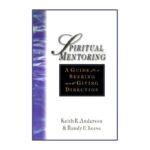You have been asked to become a mentor to another. There are few honors in life more precious than to walk alongside a brother or sister on a journey of spiritual formation. If you feel overwhelmed and doubt your worthiness for the task, this is a good sign that you are ready and may be qualified, for the ministry of a mentor begins with humility. You may feel something akin to great unworthiness and are likely to exclaim, “Who am I that anyone should emulate me? I know my own flaws and failures, my contradictions, far too well, and the passions within that rise up in unholiness, as well as moments of holiness. And yet I feel the joyfulness of opportunity—maybe I could help this friend listen to life. I know that I can ask some pertinent questions and can help this friend think through these questions.”
Why mentor
Why would you agree to fill this role in someone’s life? If there is a desire to have power over another, perhaps it is time to think again. Mentoring is not about you; it is about the other. If there is a desire to instruct and tutor another in the ways that you have found useful, perhaps it is time to think again. Mentoring is not about telling. It is about listening—to the Holy Spirit and to the life of the other. If there is a desire for status or position in the eyes of others, you will surely fail, for mentoring is a servant’s role. It is true that there are times of instructing, guiding, and sharing of wisdom, but mentoring is primarily about discernment and learning to recognize where God is already present and active in the heart of the other.
Spiritual mentoring is uniquely relational for it invites many others into the circle of conversation—voices of the past in Scripture and church tradition, voices of the present in teachers and wise guides, voices of the heart in the Holy Spirit and in the heart of your mentoree. If your need is to create a duplicate of yourself, remember that the God who makes each snowflake unique has likewise made each person unique. Your experience belongs to the particularities of your own history; do not impose it on another, but let God form the other as distinctly as God formed you.
Space for hospitality
Are you able to create a safe space for hospitality where the mentoree can allow the masks of life to be shed in order to discover the freedom of authentic conversation? Are you able to practice the spiritual discipline of confidentiality that you might protect your friend’s dignity and pain? You may hold in your hands words of failure, struggle, disbelief, doubt, discouragement, despair, brokenness, inadequacy, negligence, and delinquency. You may have information that can hurt or help your friend but cannot be shared unless they give you permission. Are you as trustworthy as you desire in the trust you would give your own spiritual mentor?
If you require precision, order, sequential progression, and careful forward motion, then you will be sorely disappointed, for spiritual mentoring is messy because life is messy, disorderly, and random. The great master of ceremonies may be at work behind the scenes, as C.S. Lewis envisoned in The Four Loves, but often the drama on center stage is chaotic, unrehearsed, and confused. The turbulence of normal life can upset and dismay, but it is in such messiness that order will surprise and design will chase away randomness.
Time is necessary
A commitment of time is necessary for spiritual mentoring. Time to listen to life together for the rhythm of God’s movement and time to listen to life alone, when each of you will meet in the space of reflective thought. Are you able to give time to your friend? There are days when spiritual mentoring seems a quiet, wasteful way to spend an hour or two. The conversation is often about little things rather than grand things. The pace is often pensive and slow. The process is sometimes stuttering, for there are large silent spaces in the conversation of reflection, but in such hours, souls are freed to sing.
You have been invited to participate in a walk through the calendar of daily life where God is not always immediately visible to the human eye, which is why you are needed, to help your friend pay attention. And what will he or she see? There will be three primary themes or empowerments you will watch for in order to develop the ever-unfolding story of a friend’s life: intimacy with God, ultimate identity as a beloved child of God, and a unique voice for kingdom responsibility. Everything we do is lived under the canopy of these three defining questions that have been the baseline questions asked throughout all of biblical history; they are the trail markers for your work as a spiritual mentor. A simple way to remember these three is through the use of three paradigmatic questions:
- Who is God?
- Who am I?
- What am I to do with my life?
A segment from…
Spiritual Mentoring: A Guide to Seeking and Giving Direction, by Keith R. Anderson and Randy D. Reese (1962-2016), pp 27-29, (IVP 1999)
_________________________________

Keith Anderson, D.Min., is a Faculty Associate for Spirituality and Vocation at VantagePoint3 and President Emeritus of Seattle School of Theology and Psychology and is the author of several books, including Reading Your Life’s Story (IVP, 2016), A Spirituality of Listening (IVP, 2016), and Spiritual Mentoring (IVP, 1999). Keith’s newest book, On Holy Ground: Your Story of Identity, Belonging and Sacred Purpose, will soon be released from Wipf & Stock Publishers. In his writing, teaching, and mentoring, Keith seeks to set a table for people looking to enter the “amazing inner sanctuary of the soul” in the most ordinary and extraordinary moments of life.



1 Comment
Your experience has the particularities unique to you, don’t try to impose that onto others but allow God to form the other in their distinct personhood. That reality is to me the heart of mentoring along with the “method” of listening is so vital to any relationship but especially to mentoring. Thank you for that reminder.